#it took me 45 minutes to realize i'd forgotten to caption the slides please forgive me
Explore tagged Tumblr posts
Text
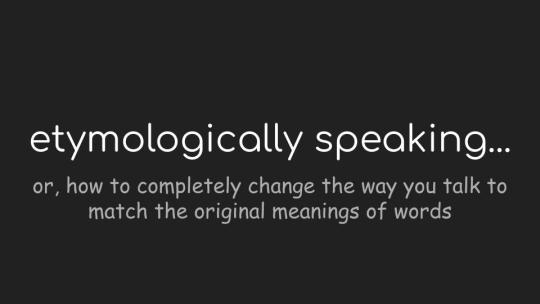
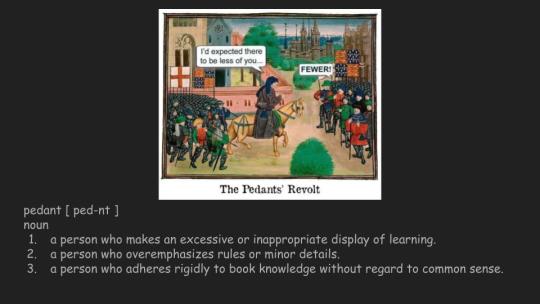

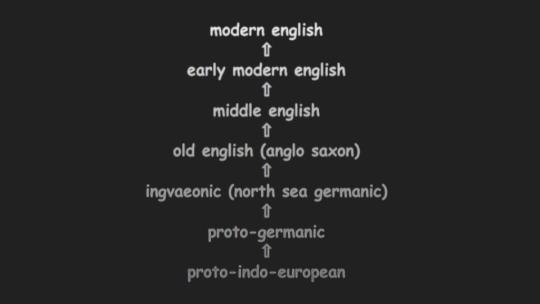
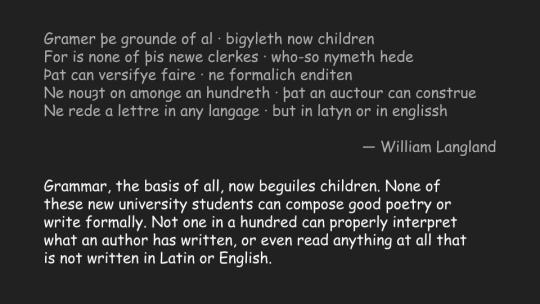


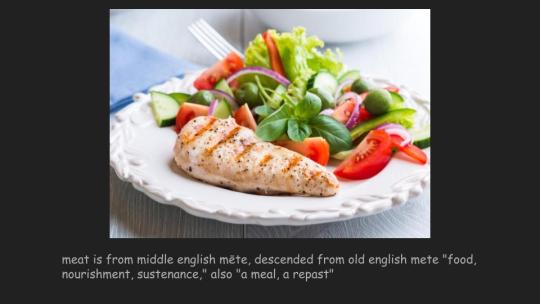

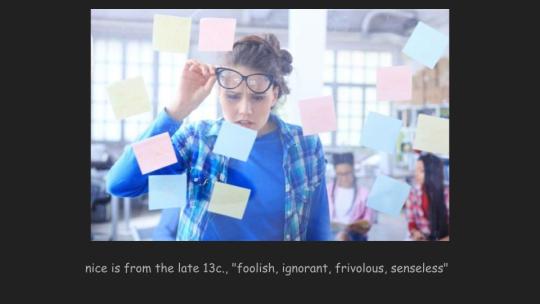
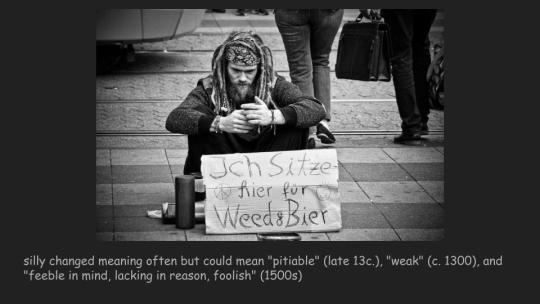

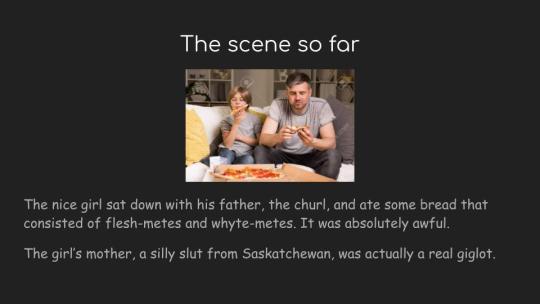

[Image IDs: slide contents 1: etymologically speaking; or, how to completely change the way you talk to match the original meanings of words. caption: so due to some posts i saw earlier today and my general saltiness levels i decided to share a powerpoint on this topic that i made a couple of years ago please enjoy.
[slide contents 2: pedant [ ped-nt ] - noun -a person who makes an excessive or inappropriate display of learning. a person who overemphasizes rules or minor details. a person who adheres rigidly to book knowledge without regard to common sense. caption: do you know any pedants? i know some pedants. [obi-wan of course i know him.jpg.]
slide contents 3: decimate!!
slide contents 4: a flow chart showing the evolution of english from proto-indo-european to proto-germanic to ingvaeonic (north sea germanic) to old english (anglo saxon) to midde english to early modern english and finally to modern english. caption: so the question is how far back this grand tradition goes. 'cause, you know, every language comes from an origin in other, older languages spoken by the people who came before us. it takes about 1000 years for a language to evolve into something that modern speakers can’t understand. that’s why anglo-saxon, which began to shift into middle english in 1100 BCE, and from middle to early modern english by 1500, is fully impossible for us to comprehend. chaucer, from the 1400s, is difficult to read, and some people even have trouble with what’s considered fully modern english as written by the constitutional framers in the 1770s. caption: we all know that pedant who says that ‘decimate’ really means to kill off one tenth, or that you can’t use the word ‘literally’ figuratively. i think if we are going to be pedants we should go whole-hog with it.
slide contents 5: Gramer þe grounde of al · bigyleth now children - For is none of þis newe clerkes · who-so nymeth hede - Þat can versifye faire · ne formalich enditen - Ne nouȝt on amonge an hundreth · þat an auctour can construe - Ne rede a lettre in any langage · but in latyn or in englissh — William Langland. caption: pedantry, is, of course, a long-standing tradition among scholars throughout history. take this quote from William Langland from the 1300s. this is full of words that have shifted meaning and/or spelling since the 1300s, although langland WAS writing in english, SO we actually need a translation to understand it.
slide contents 6: churl comes from the old english ‘ceorl’ "peasant, one of the lowest class of freemen, man without rank," which evolved to early middle english "man of the common people". caption: the modern meaning of churl is a rude, boorish, or surly person, or someone who is stingy.
slide contents 7: girl derives from an unrecorded old english word that later became ‘gyrle’ c. 1300 with the meaning "child, young person" of either sex. caption: now, we all know what a girl is. but this means in our new way of speaking english, girl is the perfect gender-neutral term we’ve all been looking for! we should immediately start calling every young child a girl. i see no way in which this could go wrong.
slide contents 8: meat is from middle english mēte, descended from old english mete "food, nourishment, sustenance," also "a meal, a repast". caption: so originally, a picture of meat would be more like this. vegetables were called grene-mete until the 15 century; dairy products similarly referred to as whyte-mete. what we now refer to as meat today would have been known as flesh-mete or simply bread. yes, bread.
slide contents 9: awful comes to us circa 1300 ‘agheful’ "worthy of respect or fear, striking with awe” or “profoundly reverential”, caption: originally a synonym of the word awesome, which has retained this sense to this day. one might think the fact that this word’s meaning has shifted so far is simply awful.
slide contents 10: nice is from the late 13c., "foolish, ignorant, frivolous, senseless". caption: nice is a word that’s shifted a lot from its meaning in the 1300s, many times, to the point where researchers sometimes don’t know what meaning someone writing in the 1700s or 1800s was even going for. so that’s nice.
slide contents 11: silly changed meaning often but could mean "pitiable" (late 13c.), "weak" (c. 1300), and "feeble in mind, lacking in reason, foolish" (1500s). caption: so you might think begging on the street is a silly way to try to make money, but under this definition it’s literally completely silly.
slide contents 12: slut is circa 1400, "a dirty, slovenly, or untidy woman" or in other words, a slob. caption: the word slut did not shift meaning from its 1400s meaning until the 1960s, which is the strongest case I know for one of these entries to go back to what it originally meant.
slide contents 13: the scene so far: the nice girl sat down with his father, the churl, and ate some bread that consisted of flesh-metes and whyte-metes. it was absolutely awful. the girl’s mother, a silly slut from saskatchewan, was actually a real giglot.
caption: what, you're telling me you don’t know what a giglot is?
caption: giglot: "lewd, wanton woman" (mid-14c.). End IDs.]
i made this presentation a couple of years ago for a comedy slide presentation event. my presentation was the most educational of the bunch and i think everyone felt betrayed.
#etymology#language#linguistics#english#powerpoint#i try to be funny#mine#it took me 45 minutes to realize i'd forgotten to caption the slides please forgive me#it should all be there now#marti made this
2 notes
·
View notes